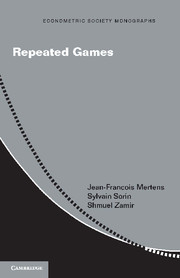Book contents
- Frontmatter
- Contents
- List of Figures
- Foreword
- Preface
- Acknowledgements
- Presentation of the Content
- Part A Background Material
- Part B The Central Results
- V Full Information on One Side
- VI Incomplete Information on Two Sides
- VII Stochastic Games
- Part C Further Developments
- Appendix A Reminder about Analytic Sets
- Appendix B Historical Notes
- Appendix C Bibliography
- Appendix D Updates
- Author Index
- Subject Index
- Miscellaneous Endmatter
VI - Incomplete Information on Two Sides
Published online by Cambridge University Press: 05 February 2015
- Frontmatter
- Contents
- List of Figures
- Foreword
- Preface
- Acknowledgements
- Presentation of the Content
- Part A Background Material
- Part B The Central Results
- V Full Information on One Side
- VI Incomplete Information on Two Sides
- VII Stochastic Games
- Part C Further Developments
- Appendix A Reminder about Analytic Sets
- Appendix B Historical Notes
- Appendix C Bibliography
- Appendix D Updates
- Author Index
- Subject Index
- Miscellaneous Endmatter
Summary
INTRODUCTION
The case of incomplete information on both sides is where neither player knows completely the state of nature. We can assume w.l.o.g. that the initial signals are chosen according to some probability P on K × A × B satisfying: for each k, there exists one and only one pair (a, b) with P(k, a, b) > 0. Just take K′ = K × A × B as a new state space and extend payoff and signaling matrices on K′ in the obvious way. It follows that the initial signals of I (resp. II) define a partition KI (resp. KII)of K. The case in which one of the two partitions KI and KII of K is {{1}, {2},…, {#K}} was treated in the last chapter.
No general results are yet available for the whole class of such games. This chapter will be devoted to the sub-case in which Qk is independent ofk; i.e., the information gained at each stage does not depend on the state of nature and is determined completely by the players' moves at that stage. Omitting the index k for the state of nature, the transition probability on signals will therefore be denoted by Q from S × T to A × B.
We shall in a first part compute the minmax and maxmin of the infinitely repeated game. In the second part, we study the asymptotic value lim vn of the finitely repeated games, which will be proved to exist always. A formula for lim vn will be proved with a few remarks on the speed of convergence.
We shall give some procedures to solve the functional equations determining lim vn and illustrate them by examples.
GENERAL PREPARATIONS
In this section, we prove some lemmas that will be needed later in this chapter.
- Type
- Chapter
- Information
- Repeated Games , pp. 326 - 391Publisher: Cambridge University PressPrint publication year: 2015



